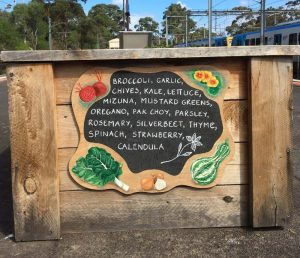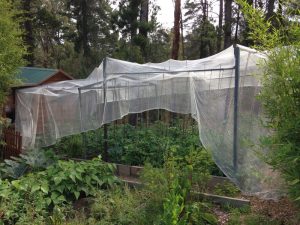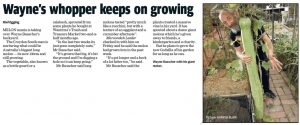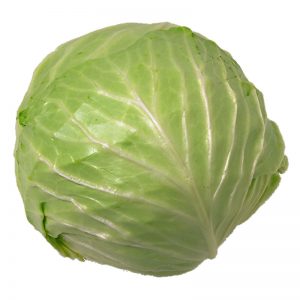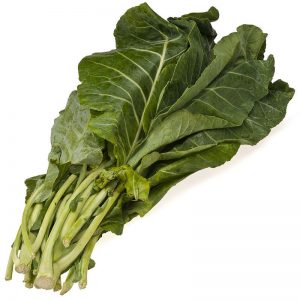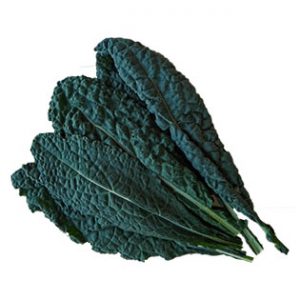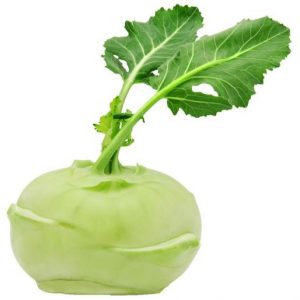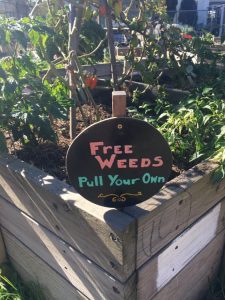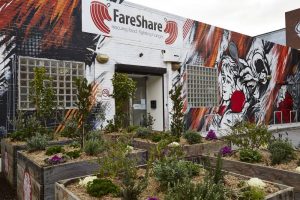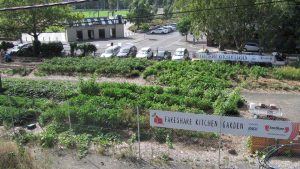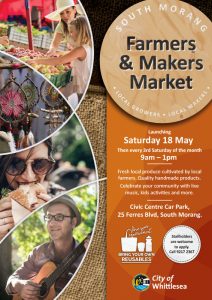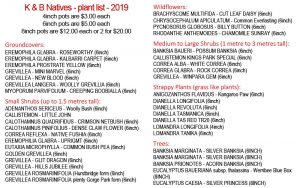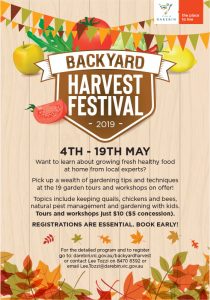Judy interviews Justin Calverley
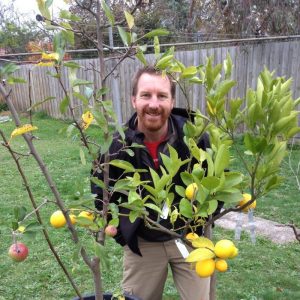 Some of you will know Justin from his workshops at CERES or Edendale. In particular, he regularly leads the 9-session ‘Introduction to Horticulture‘ courses at Edendale for the astonishingly low cost of $99 for all 9 sessions (the courses are government-subsidised), with the next two courses starting on 4th May and 31st August. Judy Vizzari recently interviewed Justin about his career as a horticulturalist. Here is how Judy introduces her interview writeup: “It’s 8.15am at Edendale Farm in Eltham. The air is still and, save a few workers, the community farm seems empty. It’s too early to see the sheep, cows, goats, guinea pigs and chickens, variously housed in their pens and coops. All is quiet. As I wander past the feijoa hedge between the training rooms and garden beds, I think about the promise of a beautiful autumn day ahead. I see a man, possibly in his late 40’s, of medium build, sandy haired and casually dressed.” Read the full interview.
Some of you will know Justin from his workshops at CERES or Edendale. In particular, he regularly leads the 9-session ‘Introduction to Horticulture‘ courses at Edendale for the astonishingly low cost of $99 for all 9 sessions (the courses are government-subsidised), with the next two courses starting on 4th May and 31st August. Judy Vizzari recently interviewed Justin about his career as a horticulturalist. Here is how Judy introduces her interview writeup: “It’s 8.15am at Edendale Farm in Eltham. The air is still and, save a few workers, the community farm seems empty. It’s too early to see the sheep, cows, goats, guinea pigs and chickens, variously housed in their pens and coops. All is quiet. As I wander past the feijoa hedge between the training rooms and garden beds, I think about the promise of a beautiful autumn day ahead. I see a man, possibly in his late 40’s, of medium build, sandy haired and casually dressed.” Read the full interview.
Robin’s veggie growing tip of the month: make your own heat bed
Heat beds provide an effective way of raising seedlings and plants during the colder months. They can be made above-ground or in-ground using fresh animal manure covered with a layer of soil or sand.
The purpose of an above-ground heat bed is to raise seedlings in punnets or plants in pots where they can’t tolerate cold roots in the winter. Such a bed is best placed inside a greenhouse or in a place protected from cold air. Simply create a box using wood or bricks, or even use a polystyrene box. Fill the base with fresh, preferably steaming, animal manure, and cover with 2-4cm of sand or soil. The decomposing manure will heat the layer of soil on top. Insert your seedling punnets or potted plants a couple of centimetres into the soil layer and you have a heat bed.
In-ground heat beds in the garden are used for plants that require higher temperatures than the soil provides for root development and growth. In our climate, this would include plants such as ginger, turmeric, galangal, cantaloupe and watermelons. For example, cantaloupe seeds require a soil temperature of 21°C to germinate and thus benefit enormously from this method as they can get a head start early in the season, allowing plenty of time then to set fruit and have it ripen. Dig a trench or hole 30cm deep, add 22cm of fresh manure, cover with 8cm of a mix of soil & compost, and plant into that.
Read more of Robin Gale-Baker’s tips
Community gardening news
Diamond Creek planter boxes in Chute Street
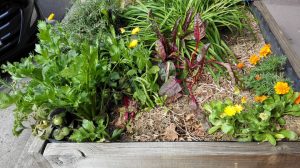 Pam Jenkins writes in: “We recently planted our cool season vegetables. Due to the heat and dryness of the summer, the beds were watered from the top (as well as filling up the water reservoirs) to try to moisten the top 3 or 4 inches of topsoil ready for planting. We practice a type of succession planting with a nod to food forests and permaculture. We remove the plants that are no longer productive, feed the soil, then fill the gaps with new season plants. This means that there is always something of interest and usually something to harvest from the beds. It also means that they don’t look regimented like a ‘real’ veggie patch. We hope that by mixing all the different plant families together, and including flowers, we will confuse most of the pest insects and encourage beneficial insects to come to eat those that are more persistent.
Pam Jenkins writes in: “We recently planted our cool season vegetables. Due to the heat and dryness of the summer, the beds were watered from the top (as well as filling up the water reservoirs) to try to moisten the top 3 or 4 inches of topsoil ready for planting. We practice a type of succession planting with a nod to food forests and permaculture. We remove the plants that are no longer productive, feed the soil, then fill the gaps with new season plants. This means that there is always something of interest and usually something to harvest from the beds. It also means that they don’t look regimented like a ‘real’ veggie patch. We hope that by mixing all the different plant families together, and including flowers, we will confuse most of the pest insects and encourage beneficial insects to come to eat those that are more persistent.
“I and my fellow volunteers would like to thank the Diamond Creek Traders Association, Mitre 10 and Local Food Connect for the supply of soil additives and plants, as well as the local traders who help with watering the beds. If you are interested in joining us, or want to find out more, please text your email address to me (0431 213 689). We meet when the boxes need attention and enjoy a social cup of coffee and a chat after the work is done.”
Diamond Creek Primary School
Jessica Betts has written in: “I am a parent at Diamond Creek Primary School and will be managing their new fruit and vegetable garden. This garden will be open to all students and will be the first time in many years that the children will be able to be involved in a garden club. The garden area currently has 8 raised garden beds that are ready for planting and we envisage another 6 beds plus a fruit tree area. For this to occur, the school garden will need wood, soil, compost, tree ties, stakes and fruit trees. Also, the students will need tools such as little spades, garden forks, veggie secateurs and buckets (they already have gloves and watering cans).”
If anyone could potentially help in acquiring the various supplies and equipment needed, email us and we’ll pass your email onto Jessica.
Growing parsnips
 Stephen Brennan writes in: “Is there any where that I can buy parsnip seedlings at the moment? I have tried planting seeds with limited success.”
Stephen Brennan writes in: “Is there any where that I can buy parsnip seedlings at the moment? I have tried planting seeds with limited success.”
My reply: No, I don’t know anywhere that is selling parsnip seedlings currently. I checked with some of my local nurseries and they said that they don’t currently have any and are not planning to get any in the near future. There appear to be two reasons for this. First, most people plant parsnips in late Winter or early Spring (i.e. Aug-Oct) rather than in Autumn. Second, parsnip seedlings are very fragile and thus, at least anecdotally, susceptible to transplantation shock and so it is generally recommended that they are grown from directly sown seed (rather than either seedlings or seed trays).
I agree that germination rates for parsnip seeds are not great. In reaction, I use fresh seed only and plant very closely (e.g. a centimetre apart), thinning them out later if needed.
What seeds to plant in May
Here is a list (see the planting guide for more detail):
BrassicasBroccoli |
Cool season veggiesBroad beans |
Leafy greensLettuce |
OtherCarrot |
If you haven’t planted your cool season veggies yet, plant them now.
Which link was clicked most times in the last newsletter?
Incredible Edible Eltham.
Proverb of the month
The toast of the town. Meaning: a person who is widely admired. This dates back to the early 18th Century. The ‘toast’ was the reigning belle of the season in the relevant circle of people. At the time, toast was mostly consumed as part of a drink, to flavour and/or heat it, rather than as a food in its own right. So, the chaps were invited to add hot spiced toast to their wine and then drink to ‘the toast of the town’. Over time, the meaning became more generalised.
‘Toast’ continued to mean ‘excellent’ up until the 1970s but, in 1984, its meaning took a 180 degree change of direction. The usage ‘you’re toast’, meaning ‘you’re as good as dead’ derives from the 1984 film Ghostbusters, where Bill Murray, as Dr. Venkman, said “All right, this chick is toast.“, as he pointed his laser-like weapon at an androgynous apparition. Interestingly, the line as delivered is rather different than that in the actual script, which read “I’m gonna turn this guy into toast.”
Gardening quote of the month
“Gardening is learning, learning, learning. That’s the fun of them. You’re always learning.” by Helen Mirren.
Joke of the week
Did you hear about the guy who stopped eating vegetables? His heart missed a beet.
As a bonus, Jenny Shaw has submitted the following:
The oldest computer can be traced back to Adam and Eve.
Surprise, surprise, it was an Apple.
But with an extremely limited memory – just 1 byte.
Then everything crashed.
New events – not cooking
Introduction to permaculture and urban agriculture (6 sessions): Fridays from 3rd May to 7th June (6 weeks), 10am-2pm; Richmond.
What: The course will include sessions on: seasonal food growing; composting and worm farming; soil preparation; plant propagation; organic pest control; and animal husbandry. Participants will gain both practical skills and basic knowledge of sustainable gardening and permaculture principles.
Cost: $77 (concession $57).
Healthy productive compost and worms: Thursday, 16th May, 6.30-9pm; Bulleen Art and Garden.
What: What you will learn: the importance of compost for soil health; how to fix common composting problems; and setting up and looking after a worm farm. Presented by Diana Cotter. Learn how to make great compost, the essential ingredient for a thriving and healthy garden. Look at worm farms and Bokashi as other options. They will also show you how to make a DIY worm farm using recycled products.
Cost: $50.
Bookings: WeTeachMe.
Worm farm workshop: Saturday, 18th May, 1-2pm; Rushall Community Garden, Fitzroy North.
What: Do you have a worm farm at home but don’t quite know how to look after it? Do you want to get a worm farm. Do you want to maintain the worm farms in Rushall Community Garden? Whichever, go along to this workshop. The workshop will be followed by a working bee, from 2-4pm, and a BBQ.
Cost: free.
Bookings: just turn up.
How to raise healthy eaters with the biting truth: Friday, 24th May, 7-8pm; Hawthorn.
What: Dietitians Alex Parker and Anna Debenham, from The Biting Truth, will be providing practical tips and tricks for parents wanting to raise healthy eaters and give their child the best start in life through proper nutrition. Their discussion will cover: achieving the perfect balance of macronutrients in each meal; foods for optimal brain development; how to read a nutrition label; choosing healthy snacks; where do treats and dessert fit in; and fussy eating tips and tricks.
Cost: free.
Bookings: EventBrite.
Grafting, pruning and espalier workshop: Saturday, 22nd June, 10-midday; Central Ringwood Community Centre.
What: Facilitated by Troy Dawes of Jeltro Cottage Permaculture. Learn all about heritage fruit tree grafting including how to start an orchard on a budget, grafting multiple varieties to the one tree, grafting techniques, tools, and choosing the all-important root stock. Combine grafting and espalier techniques and you can have all the fruit you’ll ever need in the smallest of yards! Learn about summer pruning techniques versus winter pruning and wound healing.
Cost: $25.
Bookings: by phone (9870 2602).
Winter fruit tree pruning workshop: Sunday, 23rd June, 9am-1pm; Edendale.
What: Winter is the best time to prune most fruit trees. Join Justin Calverley and learn how to best care for your fruit trees for health and to maximise your yield for next season. Bring your gardening gloves, a hat and a pair of secateurs.
Cost: $65.
Bookings: TryBooking.
Growing and cooking with bushfoods: Sunday, 23rd June, 10am-1pm; CERES, Brunswick East.
What: What you will learn: how to identify and harvest bush foods; how to grow and maintain bush foods in the home garden; and how to incorporate bush foods into everyday recipes. What you will get: handouts and recipes; and lunch and afternoon tea. Presenter: Belinda Kennedy. Tour the CERES bush food gardens, learn how to identify, grow and maintain a variety of local bush foods, gain knowledge of bush foods from further afar – tropical delights from the north, peppery spices form the south. During the workshop, you will learn how to incorporate bush foods into simple, tasty and nutritious meals, desserts and snacks. The group will make a bush food inspired lunch and afternoon tea – all food prepared on the day will be vegetarian and vegan friendly.
Cost: $80.
Bookings: WeTeachMe.
New events – cooking
Rezza cook’s club: Fortnightly from Tuesday, 30th April to Tuesday, 25th June, each 10am-1pm; Reservoir Neighbourhood House.
What: Go along and help choose a new recipe for each class. Teach or be taught how to cook the food you’ve always wanted to know how to cook.
Cost: $5 per class.
Bookings: by phone (9462 4611).
Ganache and truffles – let’s play!: Thursday, 16th May, 6.30-7.30pm; Eastland, Ringwood.
What: What you will learn: how to temper chocolate to create a shine and crispy snap; how to create ganache; and let your creativity shine through as you decorate your truffles. What you will get: a box of truffles that you have handcrafted; and a starter pack – apron, dipping tool, chocolate, recipes. Once you know how to temper and how to work with chocolate, your imagination will be your only limitation. They will make a ganache for the filling, revealing the small tricks that ensure a smooth outcome.
Cost: $60.
Bookings: WeTeachMe.
Cooking master class – ‘some winter favourites’: Thursday, 13th June, 7-9pm; Gourmet Living, Templestowe.
What: Enjoy 3 tasting size courses cooked by chef Bek McMillan, from Gourmet Living, who will demonstrate step by step. All recipes are included. Menu: warm winter veg salad; chicken gnocchi pesto bake; and fig & almond galette.
Cost: $42.
Bookings: EventBrite.
Kombucha tea making: Thursday, 20th June, 11am-midday; Diamond Valley Library.
What: Join Katherine Barling to learn how to make kombucha tea. Enjoy a demonstration of how to prepare, build and harvest the finished kombucha drink and (perhaps) enjoy some samples.
Cost: free.
Bookings: just turn up.
Summary of upcoming events – not cooking
Over the next week
- Beginners compost, worm farm and bokashi: Wednesday, 24th April, 10-11.30am; Central Ringwood Community Centre.
- Edible weeds walk: Saturday, 27th April, 11am-1pm; Brunswick East.
- Hops master class: Saturday, 27th April, 12.30-2.30pm; 3 Ravens Brewery, Thornbury.
- Edible weeds walk: Saturday, 27th April, 2-4pm; Brunswick East.
- Heritage apple tasting: Sunday, 28th April, 3-5pm; Petty’s Orchard, Templestowe.
- Make sense of food labels: Monday, 29th April, 9.30-11.30am; Eltham.
- Beekeeping basics: Monday, 29th April, 7-8.15pm; Ivanhoe Library.
- Creating retrosuburbia in your garden: Tuesday, 30th April, 6-8pm; Ivanhoe Library.
- Tomato troubleshooting – grow better tomatoes: Tuesday, 30th April, 7-8pm; Coburg Library.
- Pruning fruit trees with Karen from Edible Eden part two: Wednesday, 1st May, 6.30-9pm; Forest Hill.
Over the next month
- Introduction to permaculture and urban agriculture (6 sessions): Fridays from 3rd May to 7th June (6 weeks), 10am-2pm; Richmond.
- Introduction to horticulture – 9 session course: every Saturday for 9 weeks, starting 4th May, 9.30am-3pm; Edendale.
- Recycling your food waste at home: Saturday, 4th May, 10am-midday; Kew Library.
- Growing food in small spaces: Saturday, 4th May, 10.30-11.30am; Fitzroy.
- Kellybrook Cider Festival: Saturday, 4th May, 11am-5pm; Kellybrook Winery, Wonga Park.
- Intro to gardening workshops with DIVRS: Saturday, 4th May, 1.30-3pm; Preston.
- Home composting workshop: Saturday, 4th May, 2-4.30pm; Edendale.
- Organic backyard chook keeping with Jessamy Miller: Sunday, 5th May, 10-11.30am; Northcote.
- Make your own beeswax wraps with Emma Grace: Sunday, 5th May, 10am-2pm; CERES, Brunswick East.
- Kalorama Chestnut Festival: Sunday, 5th May, 10am-4pm; Kalorama Memorial Reserve.
- Kellybrook Cider Festival: Sunday, 5th May, 11am-5pm; Kellybrook Winery, Wonga Park.
- Backyard bees 101 workshop: Sunday, 5th May, 1-2.30pm; Preston.
- Monique’s rental abundance garden: Sunday, 5th May, 3-4pm; Northcote.
- Lakeside Good Earth Group – seed library launch and beeswax wraps: Tuesday, 7th May, 2-3.30pm; Lilydale Library.
- Paul Gale-Baker on wicking beds: Tuesday, 7th May, 7.15-9.15pm; Hurstbridge.
- How is chocolate made?: Wednesday, 8th May, 7-8pm; Coburg Library.
- French ornamental vegetable gardens: Wednesday, 8th May, 7.30-10pm; Doncaster Garden Club.
- Home composting and worm farming: Thursday, 9th May, 10.30am-midday; Thomastown Library.
- Native edibles for companion planting: Thursday, 9th May, 6.30-9pm; Bulleen Art and Garden.
- Permablitz guild social night featuring Charlie Mgee: Thursday, 9th May, 7-10pm; Northcote.
- Retrosuburbia book club: Thursday, 9th May, 7.30-9pm; Central Ringwood Community Centre.
- Damian’s biodiverse permaculture garden (garden tour): Saturday, 11th May, 10-11am; Reservoir.
- Edible weeds: Saturday, 11th May, 10am-midday; CERES.
- Home brewing with Paul Rigby: Saturday, 11th May, 10am-3pm; CERES, Brunswick East.
- Big Vegan Market: Saturday, 11th May, 10am-6pm; Royal Exhibition Building, Carlton.
- Lee’s generous sharing garden (garden tour): Saturday, 11th May, 11.30am-12.30pm; Reservoir.
- Green at Kathleen – preparing for winter harvest: Saturday, 11th May, 11.30am-1pm; Kathleen Syme Library.
- Sharing homegrown food with Luigi and Emanuela (garden tour): Saturday, 11th May, 1-2pm; Reservoir.
- Productive gardening with kids workshop at Poppy’s Patch: Saturday, 11th May, 2.30-4pm; Reservoir.
- Backyard quails workshop: Sunday, 12th May, 10-11am; Northcote.
- Big Vegan Market: Saturday, 12th May, 10am-6pm; Royal Exhibition Building, Carlton.
- Natural pest management workshop: Sunday, 12th May, 11.30am-12.30pm; Northcote.
- Guided tour of the Plummery (garden tour): Sunday, 12th May, 12.45-1.45pm; Northcote.
- Robbie’s aquaponics garden (garden tour): Sunday, 12th May, 3-4pm; Thornbury.
- Woman’s hormonal health: Tuesday, 14th May, 7-8.30pm; Hawthorn Community House.
- Composting to improve your soil: Thursday, 16th May, 11am-midday; Fawkner Library.
- Healthy productive compost and worms: Thursday, 16th May, 6.30-9pm; Bulleen Art and Garden.
- GABS Beer, Cider & Food Fest: Friday, 17th May, Saturday, 18th May and Sunday, 19th May; Royal Exhibition Building, Carlton.
- Native bee workshop for kids and families: Saturday, 18th May, 10-11am; Preston.
- Edible weeds walk: Saturday, 18th May, 11am-1pm; Brunswick East.
- Sticky date with the Backyard Honey beekeeper: Saturday, 18th May, 11am-2pm; Bunnings, Nunawading.
- Native bee workshop for adults: Saturday, 18th May, 11.30am-12.30pm; Preston.
- Worm farm workshop: Saturday, 18th May, 1-2pm; Rushall Community Garden, Fitzroy North.
- Fruit tree maintenance and pruning workshop: Saturday, 18th May, 2-3pm; Preston.
- Edible winter gardening: Saturday, 18th May, 2-3pm; Watsonia Library.
- Edible weeds walk: Saturday, 18th May, 2-4pm; Brunswick East.
- Maya’s fruitful garden (garden tour): Saturday, 18th May, 3.30-4.30pm; Preston.
- Harry’s micro orchard garden (garden tour): Sunday, 19th May, 10-11am; Northcote.
- Citrus and apple tree propagating workshop with Harry Kalathas: Sunday, 19th May, 11.30am-12.30pm; Northcote.
- Lena’s courtyard and garden (garden tour): Sunday, 19th May, 1.30-2.30pm; Thornbury.
Summary of upcoming events – cooking
Over the next week
- Flavorful Health cooking class: Wednesday, 24th April, 11am-1pm; Eltham.
- Vegan brunch cooking class: Thursday, 25th April, midday-4pm; The Beet Retreat, Smiths Gully.
- Cook Indian by the creek: Friday, 26th April, 6-7.45pm; Diamond Creek.
- Preserving workshop: Saturday, 27th April, 2-4.30pm; Central Ringwood Community Centre.
- Gluten free, grain free and wheat free workshop (thermomix): Saturday, 27th April, 2-4pm; Chirnside Park.
- Flavorful Health cooking class: Sunday, 28th April, 11am-1pm; Eltham.
- Rezza cook’s club: Tuesday, 30th April, 10am-1pm; Reservoir Neighbourhood House.
- Cooking for healthy minds (8 sessions): Tuesdays from 30th April to 18th June (8 weeks), 1.30-3.30pm; Thornbury.
- Flavorful Health cooking class: Wednesday, 1st May, 11am-1pm; Eltham.
- Cookie cake and fondant cookies with Emelia Jackson: Wednesday, 1st May, 7-9pm; Gourmet Living, Templestowe.
Over the next month
- Food preserving – Urban Pear: Thursday, 2nd May, 10am-midday; Whittlesea Library.
- Cook Indian by the creek: Friday, 3rd May, 6-7.30pm; Diamond Creek.
- No Waste Cook Club: Saturday, 4th May, 10am-midday; North Fitzroy Library.
- Sourdough bread making workshop: Saturday, 4th May, 10am-1pm; Living & Learning Panton Hill.
- Mexican – delicious everyday meals: Saturday, 4th May, 10.30am-1pm; Diamond Creek.
- Flavorful Health cooking class: Sunday, 5th May, 11am-1pm; Eltham.
- Miso paste making: Sunday, 5th May, 11am-1.30pm; Preston.
- Early Mother’s Day high tea (thermomix): Sunday, 5th May, 4-5.30pm; Kilsyth.
- Flavorful Health cooking class: Wednesday, 8th May, 11am-1pm; Eltham.
- Cacao, cocoa and chocolate: Thursday, 9th May, 6.30-7.30pm; Eastland, Ringwood.
- Cooking master class – ‘taste of Tuscany’: Thursday, 9th May, 7-9pm; Gourmet Living, Templestowe.
- Cook Indian by the creek: Friday, 10th May, 6-7.30pm; Diamond Creek.
- Seasonal ferments – kimchi + kombucha: Saturday, 11th May, 9-11.30am; Bee Sustainable, Brunswick East.
- Nuka zuke – rice bran pickling: Saturday, 11th May, 11am-1pm; Preston.
- Thai inspired vegan cooking class: Sunday, 12th May, midday-4pm; The Beet Retreat, Smiths Gully.
- Rezza cook’s club: Tuesday, 14th May, 10am-1pm; Reservoir Neighbourhood House.
- Ganache and truffles – let’s play!: Thursday, 16th May, 6.30-7.30pm; Eastland, Ringwood.
- Cooking master class – ‘simple, tasty, Indian’: Thursday, 16th May, 7-9pm; Gourmet Living, Templestowe.
- Sourdough bread workshop: Saturday, 18th May, 9-11.30am; Bee Sustainable, Brunswick East.
- Olive magic: Saturday, 18th May, 9.30am-12.30pm; Bulleen Art and Garden.
- Thai inspired vegan cooking class: Sunday, 19th May, midday-4pm; The Beet Retreat, Smiths Gully.

